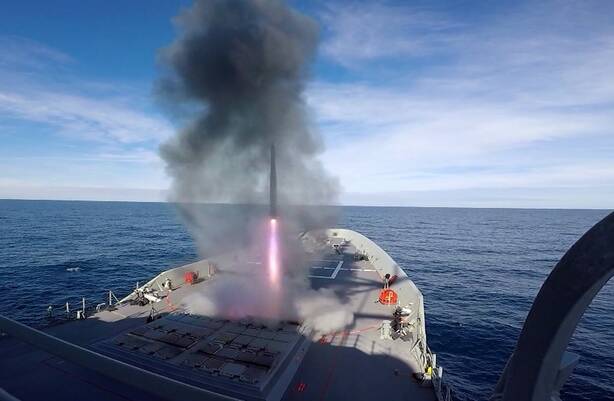
AS you may have read in Thursday's and Friday's Newcastle Herald, I spent Wednesday and Thursday at the first two days of the three-day annual Hunter Defence Conference, where a roster of high level military and industrial speakers set out the landscape as they saw it in relation to Australia's position and role in what is usually described, euphemistically, as the deteriorating security outlook.
Some of the speakers continued to use those carefully calibrated terms, but others, more forthright, said what everyone knows; that we are talking about two countries, China and Russia.
The conference heard various references to the importance of managing that relationship, but as this was a room full of people with a military disposition, the talk was much more about what we are doing from a military perspective to maximise the potency - the word "lethality" was heard a few times - of our army, navy and air force.
And not just those three.
Our military now has a space wing, and is spending serious money in the rapidly evolving worlds of cyber and information warfare, artificial intelligence (AI) and the related field of quantum mechanics.

Late on Thursday, after hours of polite discourse, Adam Gilmour, CEO and founder of the self-described "biggest rocket company in Australia", Gilmour Space, held the room spellbound as he described things from his perspective.
He started by announcing himself as a boy from Cessnock. As I found out later, it was a bit of a fudge.
He was born in Brisbane, but his father and grandfather are Coalfields locals.
"Cessnock is in my life," the 48-year-old told me yesterday.
He began by saying that if the satellites that are up there now were to be disabled, our lives would descend into "anarchy" in very short order.
"If we lose those satellites, if you try to buy a coffee on your card or your phone, it won't work," Gilmour said.
"If that annoys you and you call the bank, that probably won't work either. You won't be able to get a Uber to the bank. You won't be able to get money out of an ATM. And you won't be able to find your way home using Google Maps."
That was as "the good news".
"The bad news is that the bad guys have spent decades developing ways of knocking out satellites," Gilmour said.

He talked about anti-satellite or (ASAT) weapons launched from the land, from ships or from the wing of a fighter that track a satellite's trajectory and then "whack it".
"They don't need a warhead because the satellite is doing 25 times the speed of sound and so you can destroy it with a paperclip," he said.
"The Russians and the Chinese have become very imaginative. They have satellites that can manoeuvre next to yours and give it a bit of a nudge, maybe knock off a solar panel. Satellites are quite flimsy things.
"They can defeat them with lasers, with microwave radiation and other forms of electronic warfare. With a cyber attack they can take your satellite over and tell it to spin around until it runs out of fuel."
"We have to be very innovative to counter this and the good news is that we can."
If this all sounds a bit fanciful, I urge readers to Google his firm and the various technologies Gilmour outlined, and you will see it is all real.
A Monash University graduate and banker,Gilmour set the firm up in Singapore in 2012 before building the Australian business with his brother, James.
He explained how the space industry had been "disrupted" by companies such as Elon Musk's SpaceX, which was able to launch payloads in space for a 10th of the price of NASA.
But his early experiences with Defence headquarters in Russell, Canberra, led him to dub it "the revolving door of failure".

"You walked in hopeful and walked out in dismay," was how he described things a decade ago.
But he said the previous Coalition government had been "very pro-space" and trusted the trend would continue under Labor.
When I left the conference dinner on Thursday night he was talking with another son of Cessnock - and a former defence minister - in Joel Fitzgibbon.
Gilmour said China and Russia had stolen a march with hypersonic missiles but believed the West - with strong Australian involvement - would catch up.
It would be wrong to say this week's conference predicted an imminent war, and it seems our armed forces do not see Australia as an invasion target.
But they are alive to the potential for a "hot" or "kinetic" war breaking out this decade, and Gilmour believes it will start with one side aiming to take out the other's space assets as a first step.
Google the phrase "responsive space" and you will see plenty of US military and tech posts about a type of warfare that Gimour - with Coalfields directness - describes as "replacing our satellites (preferably within 24 hours) every time they knock one out, until they run out of missiles".
He says the Americans have working on these technologies for "almost two decades", and that they will "never give up, and keep trying until they succeed".
Australia, he says, has to be part of this. There is no alternative.
OTHER HUNTER DEFENCE ARTICLES:

WHAT DO YOU THINK? We've made it a whole lot easier for you to have your say. Our new comment platform requires only one log-in to access articles and to join the discussion on the Newcastle Herald website. Find out how to register so you can enjoy civil, friendly and engaging discussions. Sign up for a subscription here.







